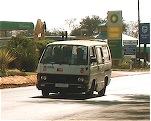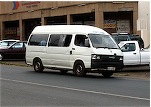Obtaining A Mini Bus Passport

Adding to the safety problem with the buses is the fact that Malawi roads are infamous for their high accident rate in spite of the fact they have so few vehicles per capita. It can be concluded that a major part of the problem has probably been centered in the fact that the police were on foot instead of in vehicles that offered the opportunity to give pursuit to a wayward driver. In order words, there were almost no police vehicles to patrol the highways and everyone was aware of it and acted accordingly. There simply was no way to slow a speeder or even to know he was speeding unless he was stopped at a roadblock. Speeding became the rule of the road and the high accident rate followed.
This all changed suddenly in 2006 with the introduction of a number of police patrol cars, motorcycles and speed detection equipment. Their introduction along the highways abruptly brought a change in driving habits by many a Malawi driver. Or, at least it did for most drivers. One minibus driver from Blantyre seemed to be an exception. It seems he was coming north out of Blantyre at a high rate of speed. In fact the police report clocked him at 140 km per hour(about 90 MPH). That is at the very top of most odometers. The police quickly gave chase in their new patrol car, and in spite of his speed they were able to overtake him and pull the bus over to the side of the road.
When the police reached the vehicle crammed with human cargo the driver leaned out the window to announce it was all right for him to speed as he had already obtained his “passport” earlier in the day.
What the police saw being held aloft was a speeding ticket that had been issued to this same driver for going 140 km earlier in the day. In Malawi a ticket issued for a non-moving violation
The minibus driver had simply applied the same principle when he paid the 5,000 Kwacha fine for speeding and tucked the ticket in his pocket. Down the road he went, accelerating until he reached the speed of 140 km per hour feeling confident that he now had his passport to speed for the rest of the day. A second speeding ticket, this one for 10,000 Kwacha suggested otherwise.

